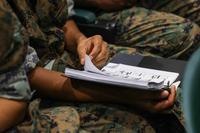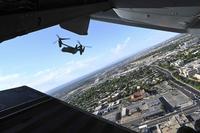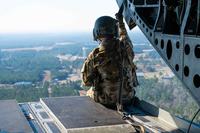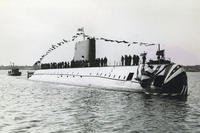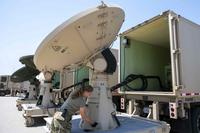The Pentagon's $582.7 billion budget proposal for Fiscal Year 2017 includes a modest 1.6 percent pay increase, more funding to counter ISIS, Russia and China, and projects to develop an "arsenal plane" and swarming "microdrones" while keeping the A-10 Thunderbolt attack aircraft in the inventory.
In an address Tuesday to the Economic Club of Washington, Defense Secretary Ashton Carter said the budget proposal, which included about $59 billion for the war funding Overseas Contingency Operations account, reflected a reshaping of priorities to meet shifting national security threats.
"Today's security environment is dramatically different than the one we've been engaged with for the last 25 years and it requires new ways of thinking and new ways of acting," Carter said, echoing the preambles of other Defense Secretaries on budget proposals.
Carter never mentioned pay in his 27-minute speech to the Economic Club of Washington, and the issue did not come up in a lengthy question-and-answer session that followed, but the proposed increase was expected to be in the range of 1.6 percent.
The 1.6 percent increase was up from the 1.3 percent increase in FY 2016 but was below the Congressional Budget Office's projected increase for private-sector wages in FY2017 of 3.2 percent, MilitaryTimes reported.
In a conference call with defense reporters, the House Armed Services Committee (HASC) Republican staff declined comment on whether Congress would seek to boost the 1.6 percent increase proposal. The pay proposal was among "all those things that will be discussed at the appropriate time," a HASC staffer said.
On the A-10 ground attack aircraft, better known as the "Warthog," Carter essentially scrapped current Air Force plans to mothball the A-10 fleet, which have consistently been rejected by Congress. In Iraq and Syria, the A-10s "have been devastating ISIL from the air," Carter said, using another acronym for the Islamic State of Iraq and Syria.
"The budget defers the A-10's final retirement until 2022, replacing it with F-35s on a squadron-by-squadron basis so we'll always have enough aircraft for today's conflicts," Carter said. Congressional advocates of the A-10 quickly charged that Carter's deferral of the A-10's retirement wasn't good enough.
Carter's announcement on the A-10 "confirms why we fought so hard and continue to fight to keep this plane flying," but "this is still an early retirement," said Rep. Martha McSally, R-Nev., a HASC member, retired Air Force colonel and former A-10 pilot.
"I'll continue to lead the fight to ensure we keep the A-10 until a suitable alternative yet to be identified is developed, tested, and proven to do the mission," McSally said in a statement.
The budget will also include proposals for developing new weaponry such as an "arsenal plane" and swarming "microdrones," which could be thrown into the air by ground troops for battlefield intelligence.
The arsenal plane concept would take an existing "large platform" aircraft, such as a B-52, stock it with a variety of munitions, and have it led into battle by an F-35 Joint Strike Fighter to provide targeting.
The proposals will be fleshed out next Tuesday after President Obama unveils the last federal budget of his term in office at the White House. The projected budget was also the first solely developed by Carter – and likely his last, since he almost certainly will step down next year with the inauguration of a new president. All of the proposals will be subject to Congressional review.
"In this budget, we're taking the long view. We have to, because even as we fight today's fights, we must also be prepared for the fights that might come 10, 20, or 30 years down the road," Carter said.
Carter said that defeating ISIS in the short term will involve greater participation by Arab and European partners and will likely include sending more U.S. troops to Iraq as trainers.
However, "in the longer perspective, we must also take into account in our budget that as destructive power of greater and greater magnitude falls into the hands of smaller and smaller groups of people, countering terrorists will likely be a continuing part of the future responsibilities of defense and other national security leaders," Carter said.
For the immediate campaign against ISIS in Iraq and Syria, Carter proposed boosting spending to $7.5 billion, which would be 50 percent more than in 2016. The increased funding would partly go to replenishing the stockpile of precision-guided bombs which have been used exclusively in Iraq and Syria in more than 10,000 airstrikes over the last 18 months.
"This will be critical as our updated coalition military campaign plan takes hold," Carter said. "For example, we've recently been hitting ISIL (another acronym for ISIS) with so many GPS-guided smart bombs and laser-guided rockets that we're starting to run low on the ones we use against terrorists the most. So we're investing $1.8 billion dollars in 2017 to buy over 45,000 more of them."
Carter said that his proposals were indicative in terms of strategy of "the broader shift reflected in this budget. For a long time, DoD tended to focus and plan and prepare for whatever big war people thought was coming over the horizon," he said. Then the focus shifted to the counter-insurgency campaigns in Iraq and Afghanistan.
The focus was again shifting toward concerns over potential "high end" threats from major nation states, Carter said "Now we have to think and do a lot of different things about a lot of different challenges -- not just ISIL and other terrorist groups, but also competitors like Russia and China, and threats like North Korea and Iran."
"We don't have the luxury of just one opponent, or the choice between current fights and future fights -- we have to do both. And that's what our budget is designed to do," he said.
Carter's proposals immediately drew fire from Congress. While praising moves to spare the A-10 and increase munitions stockpiles, Rep. Mac Thornberry, R-Tex., the HASC chairman said that both of those initiatives were kept alive against the opposition of Carter and the Obama administration.
In addition, Thornberry said in a statement that Carter was taking credit for proposals that he left unfunded. "The increase in counter-ISIS investments and deterrence of Russia are welcome and needed moves but the President's budget request, for example, does not add funds to accommodate the $7.5 billion in additional funding to counter ISIS or the $3.4 billion to deter Russia."
Thornberry also said that Carter was ignoring the spirit of the two-year defense budget deal reached last November between the administration and Congress. "Once again, the responsibility to provide the appropriate level of funding to address these threats will fall to Congress," Thornberry said, suggesting that the long budget battles of previous years will be repeated in 2016.
Thornberry and his staff appeared to have a fundamental difference with Carter and the administration on the overall figures in the budget proposals.
The Pentagon is currently in the midst of a decade-long process to cut spending by nearly $1 trillion, but the two-year deal reached with Congress last year raised DOD's spending caps by $25 billion for 2016 and $15 billion for 2017.
For FY 2016, DOD received a total of about $580 billion, which broke down to $521 billion for the base budget and $59 billion for war funding in OCO, which is not constrained by budget caps.
Carter's proposed FY 2017 budget would set the Pentagon's base budget for 2017 at about $524 billion and OCO at a minimum of $59 billion.
In the conference call with reporters, House Republican staffers said total defense spending, when funding for the Department of Energy and the National Security Agency is included, actually totaled $610 billion for FY2017.
The staffers also said that Thornberry was "disappointed" that OCO funding was being treated by the administration as a ceiling rather than a floor, suggesting that Congress would attempt to pad OCO to fund its own initiatives.
In response to questions at the Economic Club, Carter included a pre-emptive strike at the expected Congressional complaints. "I find that the great majority of members of Congress that I interact with are serious" but "sometimes they find themselves in a situation where they can't do the right thing," he said. However, "You can't just pound your spoon on your high chair," he said.
In one of his most striking proposals, Carter pushed for more than quadrupling funding for the European Reassurance Initiative (ERI) -- from $800 million to $3.4 billion -- to counter Russian threats to Ukraine and NATO allies. The funding would bolster U.S. Army Europe, forward position more supplies and tracked vehicles, and provide for the rotational deployment of an additional army brigade.
In a statement, President Obama said that the boost in ERI funding was intended to assure allies of U.S. commitments to NATO's defense, serve as a catalyst for coalition partners to increase their efforts against ISIS and in Afghanistan, and also encourage the Europeans to increase their own defense spending.
"All 28 NATO allies are members of the Counter-ISIL coalition, and NATO allies and partners must continue to work together to support the Afghan National Defense and Security Forces," Obama said in a statement.
"This budget request ensures that the United States is prepared to meet its commitments to NATO, and should be a reminder that every ally must properly resource its defense and invest in the capabilities our alliance requires," Obama said.
In his speech, Carter said the budget was intended to meet five main threats posed by ISIS, Russia, China, Iran and North Korea, and also represented a "major inflection point" in the Pentagon's long-term concepts for providing national security.
"Two of these challenges (Russia and China) reflect a return to great power competition," Carter said. "The first is in Europe, where we're taking a strong and balanced approach to deter Russian aggression -- we haven't had to worry about this for 25 years, and while I wish it were otherwise, now we do."
"The second is in the Asia-Pacific, where China is rising, and where we're continuing our rebalance to maintain the stability in the region that we've underwritten for the past 70 years, and that's allowed so many nations to rise, prosper, and win," Carter said.
In response to China's building of artificial islands in the South China Sea, Carter said "we have to react. We're going to fly and sail and operate where international law permits, period," he said. "It's self-isolating behavior" by the Chinese. "I don't know when they'll realize that."
Carter also included the usual pledges of a Defense Secretary to finally get acquisition costs under control, while acknowledging the failure to do so on the ballooning expenses for the new Gerald R. Ford aircraft carrier that could potentially reach $15 billion.
In the future, "We're not going to build them in the way that was built," Carter said of future Ford class carriers. "That was a program that was undisciplined. I'm not going to try to justify it. It's not okay."
-- Richard Sisk can be reached at richard.sisk@military.com
Check out the latest pay-related news on our Military Pay app. Get it now on Google Play or iTunes.

